My Year of Bookish Wisdom: 2016
by Miles Raymer
Introduction: A Year of Contradictions
This last year was quite a ride. Without doubt, 2016 was one of the most dynamic years of my life, both in terms of personal development and world events. When I look back on it years from now, I expect to experience feelings of deep ambivalence.
This was the year I got my first serious job in Humboldt––the year I started to learn what it meant to operate as a professional in the community that’s been my true home for as long as I can remember. It was the year of my marriage, complete with all the hopes, promises and fears that choosing a life partner brings. In my personal narrative, 2016 overflowed with joy and excitement.
It’s been a different story on the national and global stage. 2016 was the year of Brexit, the year of Trump––a year characterized by feelings of anger, betrayal and despair for liberals (and many others) around the world. The trepidation I carry into the opening weeks of 2017 is unlike anything I’ve ever felt. It whispers a threat to the happy fruits of my local labor. Worse still, I realize that my predicament is utterly benign compared to that of millions in this country and around the world whose livelihoods are already or will be compromised by the political choices made in coming years.
My Year of Bookish Wisdom 2016: Confronting Limitations
2016 taught me that the world I think I’m living in isn’t necessarily the world I’m actually living in. I’ve learned some hard lessons about the shortcomings not only of my own perspective, but also about the limitations of the sources and individuals I trust to help me understand and navigate the world.
Limitations are omnipresent in human existence, but we often have to ignore them in order to get things done; an overzealous preoccupation with limitations is tantamount to paralysis. But 2016 left me wondering: what if I’m not preoccupied enough with my limitations, and with the limitations of my world?
In an effort to address this question, this year’s essay on bookish wisdom will focus on the difficult and painful process of exposing and confronting limitations of all kinds. For only after a limitation is acknowledged can it be analyzed and overcome.
Nonfiction
This election season forced white, liberal America to confront the ugly truth of America’s racial present, joining the droves of nonwhite Americans who’ve never had a choice about confronting that truth and struggling against it every day. For those of us lucky enough to be relatively educated about the history of slavery and racial discrimination, this process wasn’t quite as difficult as for those with little or no knowledge of our shameful past. But even the best education is no substitute for raw experience, and the difficult reality––the insurmountable limitation––is that white Americans just don’t get what it’s like to be a person of color in our society. White Americans who care about social justice, therefore, face a tricky dilemma: how can we make our best effort to understand and ameliorate the racial problems in our society, while also acknowledging that there is a whole realm of American racial experience to which we will not, and cannot, relate?
In trying to wrap my head around this issue, I joined many of my fellow Americans in reading Ta-Nehisi Coates’s Between the World and Me.
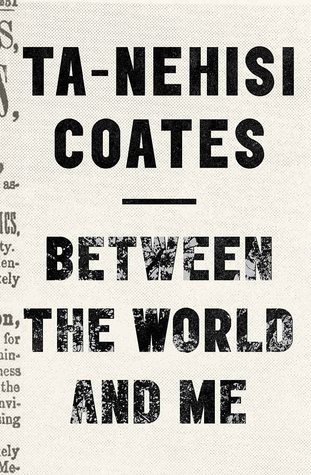
This remarkable book deserves every accolade and acolyte it has garnered since its release in 2015. It is a stunning record of courage and honesty, one that doesn’t pull punches or let anyone off the hook. Coates’s voice, though tightly directed at his teenage son, has overflown into American consciousness, where I hope it will make a permanent home.
In an era when the rights of American minorities are more imperiled than in any time since the Civil Rights Movement, the need for minds like Coates is dire. But Between the World and Me isn’t just a book about being black in America. It’s also a humanist text that celebrates the peculiarity of the body and lays bare the tragedy of the body’s desecration:
Think of all the embraces, all the private jokes, customs, greetings, names, dreams, all the shared knowledge and capacity of a black family injected into that vessel of flesh and bone. And think of how that vessel was taken, shattered on the concrete, and all its holy contents, all that had gone into him, sent flowing back to the earth. (81-2)
Although I know this book wasn’t intended to strike at the heart of American prejudice or reshape our country for the better, I sincerely believe it will play a part in doing so, if such a thing can still be done.
There is more than enough fear to go around these days, so we need to think carefully about the nature of fear-based thinking. National security, that nebulous practice we entrust to various government agencies, is an activity that depends on fear, that lives intimately with fear and welcomes it home. Michael V. Hayden’s Playing to the Edge provides tremendous insight into the lives of people we charge with our collective safety––with standing between us and our fears.
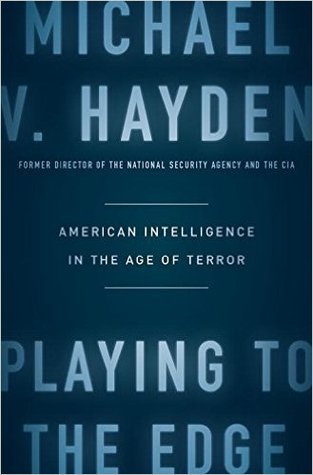
Playing to the Edge is all about the limits of security––how to maintain them, how to expand them, how to break them. It is a thoughtful, smart, and occasionally brutal book with an important message for those who “criticize intelligence agencies for not doing enough when they feel in danger, while reserving the right to criticize those agencies for doing too much when they feel safe again” (34-5). Though I still have mixed feelings about Hayden and the work he did under the Bush Administration, he educated me about the inimitable role intelligence agencies play in the modern world, and forced me to confront my own slice of responsibility for American atrocities.
In this age of globalization and instant communication, it can be easy to forget our fundamental physical limitations, those of land and sea. Tim Marshall’s Prisoners of Geography makes an excellent case for the geopolitical outlook, which argues that geography exerts––and has always exerted––a disproportionate influence on the behaviors of people and societies.

As a spatially-challenged thinker, geography has never been my strong suit, but Marshall’s clear writing and effective examples made it easy to grasp how geography has forced humans time and again to work around nature’s design. And even though these natural boundaries seem less critical in the post-industrial world, Marshall reminds us that “Geography has always been a prison of sorts––one that defines what a nation is or can be, and one from which our world leaders have often struggled to break free” (259). Geography is one of the great delimiters of human progress––a complex system of barriers and conveyances that forces us to confront the world as it is, and not how we would have it be.
The human mind is an equally important prison––one that determines literally every single limitation of our existence. That is why the title of Frans de Waal’s most recent book is so refreshing: Are We Smart Enough to Know How Smart Animals Are?
As a longtime naturalist and science communicator with a specialization in primatology, de Waal posits the question of animal intelligence not as a matter of defining “intelligent behavior” and then designing tests to see if various animals make the grade, but rather as a challenge to humanity’s default understanding of intelligence as a unitary phenomenon that could somehow apply equally to all animals.
de Waal champions the practice of “ethology,” a scientific approach which “emphasizes species-typical behavior as an adaptation to the natural environment” (320). Ethologists scour the natural world for evidence of different types of animal intelligence, and although much research still needs to be done, there is already plenty to justify the basic proposition that intelligence is a pluralistic phenomenon. Instead of expecting animals to behave in ways that we humans consider “intelligent,” the actual project is for us to be flexible enough to understand how each species has evolved its own, species-specific type(s) of intelligence over time:
Every species deals flexibly with the environment and develops solutions to the problems it poses. Each one does it differently. We had better use the plural to refer to their capacities, therefore, and speak of intelligences and cognitions. This will help us avoid comparing cognition on a single scale…It seems highly unfair to ask if a squirrel can count to ten if counting is not really what a squirrel’s life is about. The squirrel is very good at retrieving hidden nuts, though, and some birds are absolute experts…There are lots of wonderful cognitive adaptations out there that we don’t have or need. This is why ranking cognition on a single dimension is a pointless exercise. Cognitive evolution is marked by many peaks of specialization. (12, emphasis his)
Similar to many great scientists that came before him, de Waal understands that humanity’s most daunting limitation isn’t the world itself, but rather our usually-inadequate ways of understanding and explaining it.
When it comes to limitations that undercut humanity’s ability to live with itself (which seems to get harder every day), nothing is more critical than our capacity for caring––for ourselves, for others, for the natural world. As a person who often struggles to overcome my critical nature in favor of kindness, I know this better than some. That is why I was overjoyed this year to discover one of the best philosophy books I’ve ever read: Milton Mayeroff’s On Caring.
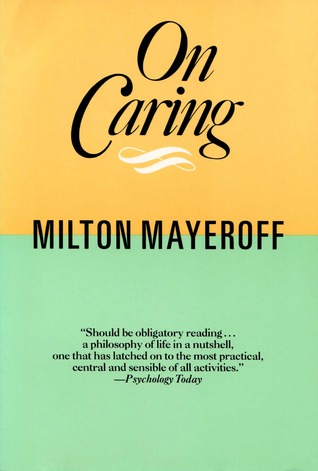
I cannot heap enough praise on this tiny, brilliant book. Taking the advice of a dear friend (who also happened to be my wedding officiant), I read it in the weeks leading up to my marriage. I cannot imagine a better text with which to frame the act of committing one’s life to caring for another person. Mayeroff presents the act of caring as a constant nuturing of mutual growth between oneself and the other (which he broadly defines as any person or thing which is cared for):
I experience the other as an extension of myself and also as independent and with the need to grow; I experience the other’s development as bound up with my own sense of well-being; and I feel needed by it for that growing…Besides the other’s need for me if it is to grow, I need the other to care for if I am to be myself…To say I need the other if I am to be myself does not mean I basically experience the other as a means, as existing simply to satisfy my own needs. I do not try to help the other grow in order to actualize myself, but by helping the other grow I do actualize myself. (11-2, 40, emphasis his)
This style of interpersonal thinking is not novel to me, but Mayeroff captures it with a simplicity and depth that is nothing short of remarkable. If the anxiety and uncertainty with which we plunge into 2017 has you looking for books to revitalize your faith in the human project, On Caring should be at the top of your list.
Fiction
Each reader has imaginative and intellectual limitations that prevent him or her from understanding or connecting with certain texts. Personally, I’ve always been the kind of reader who will become vicious in my assessment of a book I deem boring, intellectually unsound, or morally reprehensible. It’s the classic caveman response: I no like this. I no understand this. This bad. James Joyce’s Ulysses gave me an opportunity to examine this tendency in myself and explore a different method of assessment.
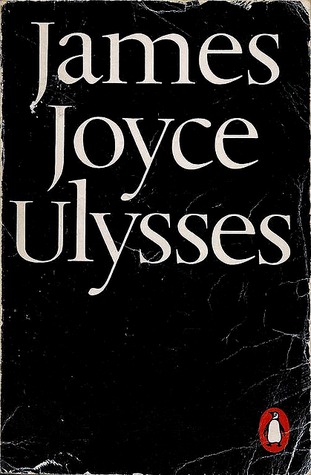
Ulysses is famous for being inscrutable and so allusion-heavy that only those with a deep understanding of the Western Canon can begin to unravel it. I found this to be both completely true and completely untrue. Did I understand what was going on during most of the book? Not at all. Did I follow all the erudite witticisms and winks to the literary past? Definitely not. Even so, the pure feel of this book could be intoxicating. Reading it exhausted me, but also pulled me into blissful states of awe and happy supplication. You might say the book conquered me, and that in the end I was delighted to be conquered by it. When I sat down to review it, something very unusual flowed from my fingertips––a flurried, mimetic tribute; it was the most fun I had writing anything in 2016.
Hanya Yanagihara’s A Little Life was my favorite piece of fiction from 2015, so last year I decided to check out her first novel, The People in the Trees.
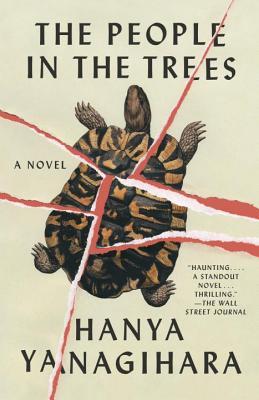
I’m sure she still has a long career ahead of her, but it would appear that Yanagihara can’t put pen to paper without writing something terrifying and sad. Fortunately, she has yet to publish a novel that isn’t also riveting and deeply thoughtful. The People in the Trees is all of those things, and also one of the weirdest books I’ve ever come across. It posits a host of difficult questions: What would you be if your personality was dominated by all the worst human tendencies––unchecked ambition, apathy, selfishness, pettiness and cruelty? Would you accept limitations in trying to justify yourself to yourself, or to others? What if you stumbled on one of the most profound scientific discoveries in human history? Would bringing that discovery to the world absolve you of your evil deeds, or somehow neutralize your monstrous nature? If these are questions that pique your interest, The People in the Trees is a book for you.
Literary history is replete with epic love stories, so it’s hard to think that one published today could inject fresh energy into the genre. But Lauren Groff’s acclaimed Fates and Furies does just that.
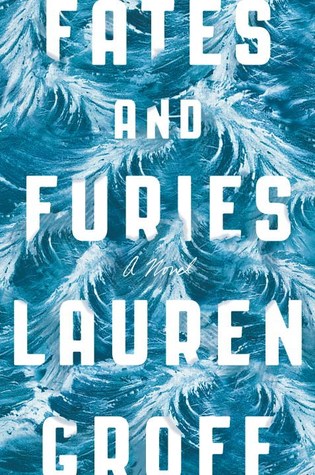
Fates and Furies has a lot to say about the limitations of individual perspectives, exploring the ways in which lovers come to see each other clearly, and the ways in which they utterly fail to do so. It is the two-toned story of Lotto and Mathilde––two protagonists with wildly different backgrounds and points of view. Though they share a great and authentic passion for one another, they come short of mutual understanding because each seeks to preserve an idea of the pristine romantic other rather than dealing with the actual person in front of them. Groff’s writing––the beating heart of this elegant novel––is superb.
Every culture has its groundbreaking works––pieces of art that rupture something in the consciousness of a generation, forever changing the intellectual landscape. Any novelist seeking to surpass limitations must begin with a thorough understanding of what those limitations are. Perhaps no one in history has understood this better than Miguel de Cervantes, as demonstrated in his magnum opus, Don Quixote.
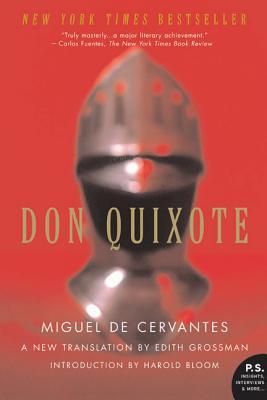
Don Quixote is truly our “first modern novel,” a magnificent record of post-Medieval consciousness breaking free of its history and forging a new path. Quixote himself straddles the border between two worlds––one long past and the other not yet arrived. No matter where he goes, Quixote is out of place. But Quixote is small potatoes compared to the true hero of this tale: the great squire, Sancho Panza. Sancho struck me as an unexpectedly political figure whose sentiments would not feel foreign in today’s political debates:
I am your vassal, but not your slave; the nobility of your blood does not have nor should it have the power to dishonor and scorn the humbleness of mine; I, a low-born farmer, esteem myself as much as you, a noble lord, esteem yourself. Your force will have no effect on me, your wealth will hold no value for me, your words will not deceive me, and your sighs and tears will not soften me. (233)
This seems like one dirty trick on top of another, and not honey on hotcakes. How nice it would be after pinches, slaps, and pinpricks to have a few lashes. Why not just take a big stone and tie it around my neck and put me in a well, and I won’t mind it too much since I have to be a laughingstock in order to solve other people’s problems. Let me alone; if not, I swear I’ll knock down and destroy everything, and I don’t care what happens. (911)
In this year when everything seemed saturated in political fervor, perhaps I read more into Sancho’s political import than was reasonable. All the same, I gloried in his defiance of the established hierarchy, in his courageous assertion of his basic humanity and integrity. And I shivered at his resentment of wrongdoing and promise to “knock down and destroy everything.” Not an ounce of this ferocity is lost in time or translation.
I’ve yet to mention the most mundane limitations humans must contend with: our petty biases, based on nothing except caprice and a fervid need to keep the complexity of the world at bay. We can’t help it; we’re wired that way. Even so, it does us good to have our assumptions questioned and revised. So it was with my discovery of the Kate Daniels urban fantasy series by Ilona Andrews.
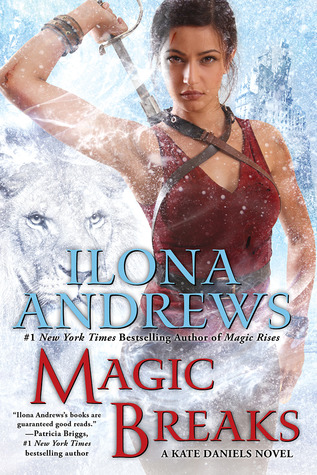
Books with covers like the one above used to be automatically disqualified from my potential reading list. I’ll cop to that degree of snobbery, but also point out that it didn’t prevent me from falling head over heels in love with this series. Following some vociferous prompting from my wife, I gave the first book a try. And then the second book, and the third. You know how the rest goes. As I write this, I’m almost done with book nine.
The Kate Daniels series takes place in near-future Atlanta during a slow-motion, magic-driven apocalypse. It’s a world with two opposing sets of natural laws, where the influence of magic and technology wax and wane according to the whims of the universe. It has shapeshifters. It has vampires. It has pretty much every magical thing you could think of.
But that’s just the window-dressing. The series is really about how logical families coalesce, how interpersonal bonds are forged through reliability, compassion, sacrifice and love. The characters are wonderful and dynamic. The world-building is top-notch. The ethical dilemmas are thoughtful and complex. The writing––well, it’s good enough. When the limitations of the real world overwhelm, sometimes we just need a retreat, and this adults-only Buffy the Vampire Slayer meets Harry Potter wonder-scape was my favorite retreat of the year. Not only did these remarkable books dominate the last few months of my 2016, but they also invaded the bookshelves of many of my closest friends.
Conclusion: What Next?
It’s impossible to know what the future will bring as we slide into 2017, but one thing we know for sure is that we’ll continue to run up against the limitations that make life a damned difficult endeavor. It can be easy to forget that my experience of life as an intermittent struggle––rather than a constant one––should be a source of gratitude rather than resentment. Sadly, almost all of life’s most important truths are easy to forget. We get tired. We get stressed. We get mean. We fail to be the people we ought to be, and things get ugly.
Even so, our failures are not immutable or immortal. We pick ourselves up. We build, and rebuild. We love. We have moments of rapture, of peace, of genuine contentment. Each is its own miracle, sprung from an awestruck confrontation with the most intimate limits of our little lives:
The unfathomable character of existence is not a matter of ignorance to be resolved, it is not something to overcome by knowing more or having some special knowledge. Instead, like wonder, it is something to undergo, to realize, and to appreciate. I am not simply speaking about the mystery of coming into being and passing out of being, or the strange sense that I was not here at the beginning and will not be here at the end. I am speaking, rather, about the mystery of existence itself, the mystery and amazement that anything exists at all.
This awareness of unfathomability is not something to fear and flee from, but to realize deeply. Unlike the experience of the uncanny, it does not separate me from other people; it brings me closer by making me more aware that whatever our powers or limitations, whatever our possessions or lack of possessions, we are all in the same boat. This is not a leveling down that does away with differences. On the contrary, it makes for a greater appreciation of the uniqueness of others and of myself. I realize more deeply my own insignificance, as if I were a brief flame in an endless darkness, and I am also more aware of my incomparable worth, a preciousness that is somehow bound up with being a once-and-for-all, never to be repeated. (On Caring, 93-4)
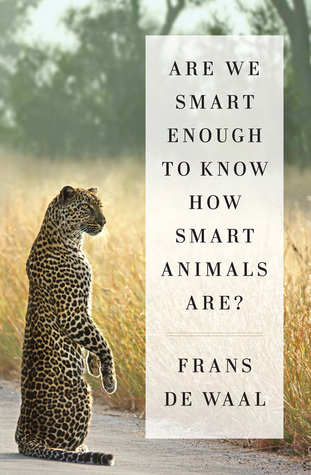
Wow! You took on some tough books this past year Miles. No wonder you didn’t reach your usual number of books read. Ulysses, Don Quixote, etc! You do like a challenge. Glad you enjoyed On Caring and found it useful. I look forward to reading the Andrews books. Nice conclusion, by the way. It was a tough year and the coming year will no doubt be challenging for us all. Let us hope that with friends, the Homo Sapien kind and the book kind, we will all find better ways of being:)
Fully agreed! Thanks for reading!
Nearly a year late, but I finally got around to reading this. Greatly enjoyed it, and as always I’m impressed with your broad interests and perspicacious insights.
Thanks, Logical Brother! Stoked that you got around to it and enjoyed. Your readership is appreciated as always!